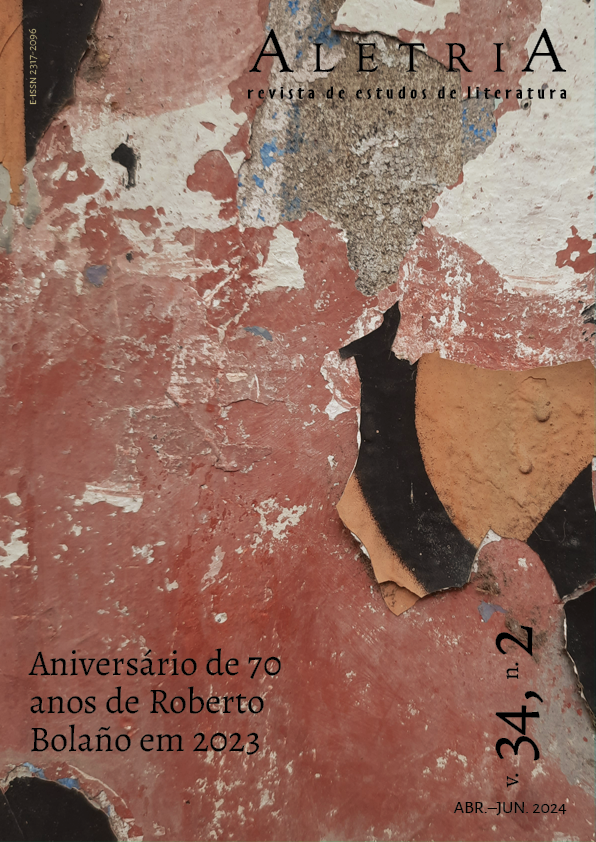Savage “Detectives” and Trivialization the of Evil
The Narrative Universe of Belano/Bolaño
DOI:
https://doi.org/10.35699/2317-2096.2024.49695Keywords:
Roberto Bolaño, “Detectives”, Coup d’état, Value relativism, Historical memory, Bolaño’s readerAbstract
In order to mitigate the damage inflicted by the violence of the 1973 coup d’état, the Chilean post-dictatorship developed a strategy: to relativize the facts. It is a consensual whitewashing aimed at erasing the historical trauma. This operation is revealed – in a surreptitious way and between the lines – in the dialogue that two former police agents of the dictatorship maintain in the story “Detectives”. In this context of mutilations, Bolaño’s art – with knowledge of the world and full management of resources – reinforces its ethical-aesthetic character through the restitution of memory, but also through the alteration of the literary phenomenon since it delegates exclusively to the reader the function of unraveling the truth of a personal and collective history.
Downloads
References
BENJAMIN, Walter. El narrador. Santiago: Metales pesados, 2008.
BOLAÑO, Roberto. Entre paréntesis. Ensayos, artículos y discurso (1998-2003). Barcelona: Anagrama, 2004.
BOLAÑO, Roberto. “Detectives”, en Cuentos completos. Barcelona: Debolsillo, 2019. p. 123-141.
BORGES, Jorge Luis. Cuentos completos. Bu enos Aires: Debolsillo, 2023.
CANDIDO, Antonio. “El derecho a la literatura”, en Ensayos y comentarios. México DF.: Fondo de Cultura Económica, 1995. p. 123-135.
CERTEAU DE, Michel. La invención de lo cotidiano. México: Universidad Iberoamericana, 2000. (v. 1: Artes de hacer)
CORNEJO POLAR, Antonio. Escribir en el aire. Ensayo sobre la heterogeneidad socio-cultural en las literaturas andinas. Lima/Berkeley: CELACP, 2003.
CHANDÍA ARAYA, Marco. “Sensini”, narrar el horror: el arte de Bolaño Signo. Santa Cruz do Sul, v. 48, n. 92, p. 76-90, mai/ago. 2023. Disponível em: https://online.unisc.br/seer/index.php/signo/article/view/18287. Acesso em: 25 jan. 2024.
DEL POZO, José. Historia de América Latina y del Caribe. Desde la independencia hasta hoy. Santiago: Lom, 2009.
LARRAÍN, Jorge. Identidad chilena. Santiago: Lom, 2001.
LEJEUNE, Philippe. El pacto autobiográfico. Suplementos Anthropos, n. 29, 47-61, 1991.
MORALES T., Leonidas. Ensayos. Crítica literaria y sociedad. Santiago: Universidad Diego Portales, 2013.
MOULIAN, Tomás. Chile actual: anatomía de un mito. Santiago: Lom/Arcis, 1997.
RICHARD, Nelly. Residuos y metáforas: ensayos de crítica cultural sobre el Chile de la Transición. Santiago: Cuarto Propio, 2001.
ROJO, Grínor. La cultura moderna de América Latina. Volumen III. Tercera modernidad (1973-2020). Santiago: Lom, 2023.
SHARR, Adam. La cabaña de Heidegger. Un espacio para pensar. Barcelona: Gustavo Gili, 2015.
SUBERCASEAUX, Bernardo. Chile o una loca historia. Santiago: Lom, 1999.
Downloads
Published
How to Cite
Issue
Section
License
Copyright (c) 2024 marco chandia araya (Autor)

This work is licensed under a Creative Commons Attribution 4.0 International License.
Authors who publish with this journal agree to the following terms:Authors retain copyright and grant the journal right of first publication with the work simultaneously licensed under a Creative Commons Attribution Non-Commercial No Derivatives License that allows others to share the work with an acknowledgement of the work's authorship and initial publication in this journal.Authors are able to enter into separate, additional contractual arrangements for the non-exclusive distribution of the journal's published version of the work (e.g., post it to an institutional repository or publish it in a book), with an acknowledgement of its initial publication in this journal.Authors are permitted and encouraged to post their work online (e.g., in institutional repositories or on their website) prior to and during the submission process, as it can lead to productive exchanges, as well as earlier and greater citation of published work (See The Effect of Open Access).





